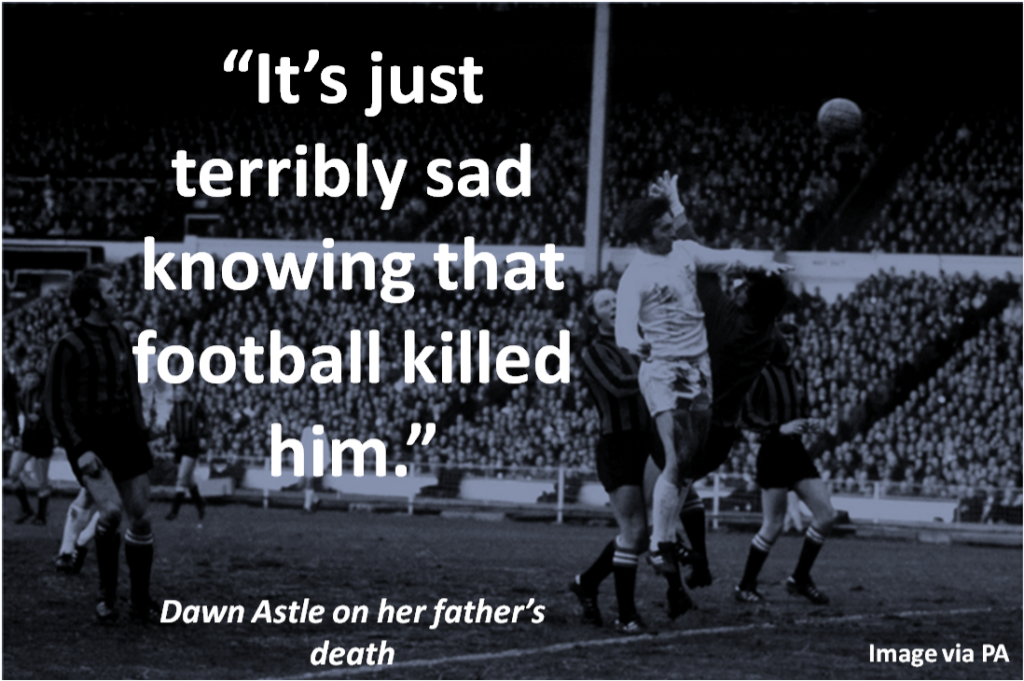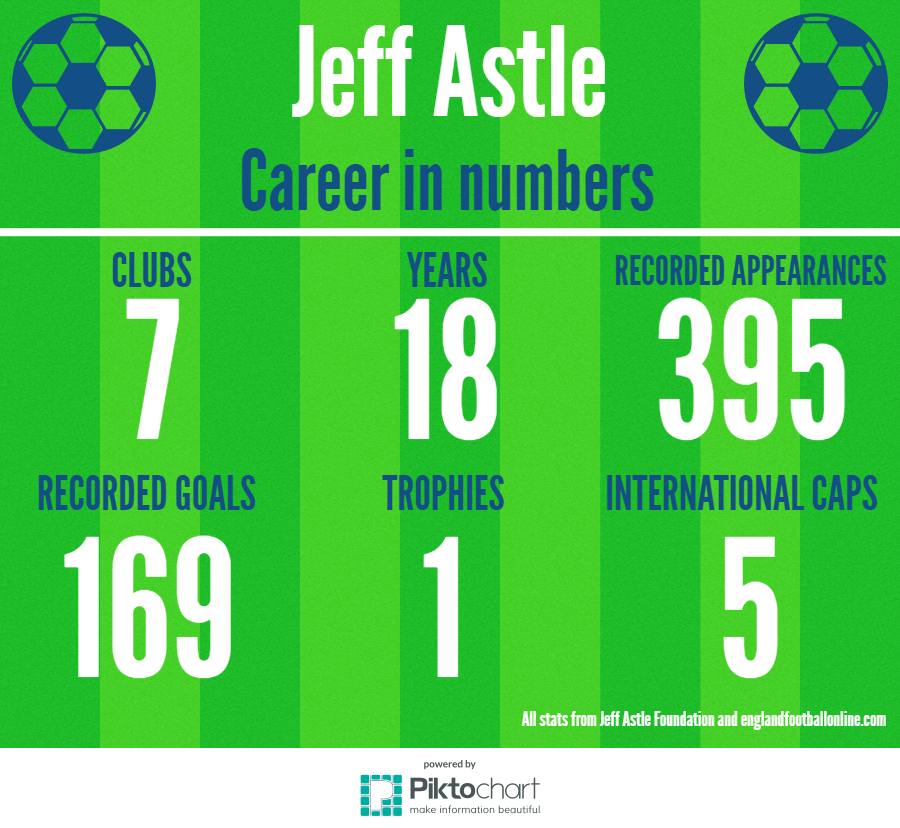THE family of a former England footballer has accused the Football Association of “dragging their heels” in educating people about concussion and brain injuries in football.
Dawn, Jeff Astle’s oldest daughter, cites a failed promise made by the FA during a meeting with her in December 2015.
Jeff, who scored the winning goal in the 1968 FA Cup final, passed away in January, 2002 aged 59.
Since May 2014, Jeff has been remembered as the first professional footballer confirmed to have
died from chronic traumatic encephalopathy (CTE), a progressive, degenerative brain disease found in individuals with a history of head injury, often as a result of multiple concussions.
TIMELINE: Who is Jeff Astle?
Drag your cursor to the right hand side and click on the arrow to move to the next slide
Jeff’s case was believed to have stemmed from repeated heading of a football during his career and Dawn believes the progress the FA have made since his death has been too slow.
“As far as football is concerned, sadly, I do think they’re dragging their heels,” she said.
“We met with the FA and PFA, in December 2015, at St George’s Park. We spoke about many things: the guidelines that were put in place, grassroots guidelines, but we also spoke about the impact of heading footballs – what they call sub concussive injuries – and also incidents of dementia in former footballers.
“In April, this year, the families of the 1966 World Cup players very bravely came out and said that their husbands or dads had got degenerative brain disease and I think a quote from the FA was that a series of questions were being put to Fifa imminently.
“If I take you back to our meeting, they actually told us then that a set of questions would be sent to Fifa. So to read that nearly half a year later that they still hadn’t sent them to the Fifa was indefensible and inexcusable really. How long does it take to set a series of questions up?”
However, it isn’t the first time that Dawn has been left disappointed with the FA’s actions.
“At the time [of Jeff’s death], the FA and PFA said they’d be doing a study and obviously we found out 10-12 years later that this study was never completed and nothing was done to replace it, which was shocking really. An industrial disease verdict, in other words dad’s job killed him and they tried to sweep it under the carpet in our opinion. I think they’re genuinely scared of what the results will show.
“It was devastating. It wasn’t just about dad, this was about the generation of footballers that played with dad, and it’s about the generation playing now and about the generation of footballers of the future.
“The whole thing is disgusting and disrespectful to my dad’s life because his life was important but now because of what the coroner said his death was, it’s just as important because of the implications it would have on the game.”
However it’s a claim that Bramhall strongly refutes, claiming that the organisation are doing all they can to improve concussion knowledge.
“We’re trying hard. The study was published. We’ve got 35 young players against people of the same age outside of the game, but people drop out of the game, it makes it hard.
“We’ll keep trying until we get some credible research, we’ve said that in a letter to her.”
 Jeff, who represented England at the 1970 World Cup in Mexico, is one of only seven players in the history of the FA Cup to score a goal in every round including the final.
Jeff, who represented England at the 1970 World Cup in Mexico, is one of only seven players in the history of the FA Cup to score a goal in every round including the final.
Dawn, who describes Jeff as a “magnetic charge”, saw the reason for his death changed to “industrial disease” by a coroner some years after he died aged just 59.
“He was just this huge larger than life character.
“I think that’s why it was so shocking to us as a family when you’ve got this sort of character in your life. This whole part of your family that was then just lay on the settee and didn’t speak and drank out of a baby beaker.
“I can’t even say it’s devastating, it’s a thousand times worse than that,” Dawn said, as a tear started to show in her eye.
Dawn believes the understanding of the risk of brain injuries amongst grassroots players is “low” and believes the FA have been “years behind” in addressing the issue.
“With football, guidelines were put in place before the start of the season but it took a good eight months or so for them to put something in place at grassroots level,” Dawn said.
“That’s where it starts really, educating kids, not scaremongering them and not telling them to not play sport.
“We all know the benefits of playing sport but brain injuries shouldn’t be classed as an acceptable consequence.
“I think the key is actually informed choice, just like with smoking. You know it can give you cancer but it’s your choice whether you do it or not. In football, all these studies have found there could be a chance of you getting degenerative brain disease but you should still have choice whether to play or not.”
She also believes the term “concussion” is a “wishy washy word” and believes people would probably pay more attention if it was called a brain injury.
The 48-year-old is championing a scheme where coaches attend their local FA branches to undertake a concussion and brain injury awareness course. There is no such scheme in place at the moment, but it’s one that Dawn would like introduced sooner rather than later.
INFOGRAPH: Jeff Astle’s career in numbers
 Dawn and her two sisters have set up The Jeff Astle Foundation in memory of their dad. The foundation was three key objectives to support, educate and encourage independent research on the issue.
Dawn and her two sisters have set up The Jeff Astle Foundation in memory of their dad. The foundation was three key objectives to support, educate and encourage independent research on the issue.
Support is currently at the forefront of her mind and it’s evident from listening to Dawn, it’s something she’s incredibly passionate about.
“Football owes it to them [the ex-players and their families]. I think the thing we have in our favour is football never forgets its old heroes.
“They’ve laid the foundations of what the game is today and I don’t think anyone would like to think that families are having to sell everything their husband or dad has won to get them proper care because that’s just wrong.”
However, she doesn’t believe the families are getting the right level of support from within the game.
“I don’t think they are doing enough. We’ve had many families contact us via the foundation about their husbands or their dads having dementia. I know there are cases where they’ve actually informed the PFA and not even had a reply off them so I know they said it’s very difficult.”
The FA were also contacted for comment, but failed to reply. However, Dawn has a meeting set up with the FA’s Head of Performance Medicine Dr Charlotte Cowie later this month to discuss the progress that’s been made and she’s hopeful of leaving “at least a little happier”.
It is clear that the battle to get football to understand the risks of brain injuries is still in its infancy and that a lot more needs to be done.
With people like Dawn campaigning though, that work is slowly but surely starting to be done.
By Callum Matthews
@matthews1818















Recent Comments